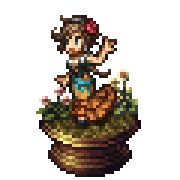|
sebmojo posted:Ime players never surrender. IME Players occasionally surrender in Fate because it has mechanics to make that a non-suicidal thing to do. And don't in any other game.
|
|
|
|

|
| # ? May 11, 2024 05:48 |
|
Squidster posted:Sorry, I'm a little unclear; is this a game you're running together? No I was just offering my perspective on things I learned/tried in my current game
|
|
|
|
neonchameleon posted:IME Players occasionally surrender in Fate because it has mechanics to make that a non-suicidal thing to do. And don't in any other game. 13th age has a 'campaign loss' mechanic, but i DMd a 5 year long campaign and they didn't use it once.
|
|
|
|
My players hated the idea of taking a campaign loss to the point where it blew apart our entire campaign.
|
|
|
|
My Lovely Horse posted:My players hated the idea of taking a campaign loss to the point where it blew apart our entire campaign. I've had to stop "if you try and fight this enemy you'll definitely die" because they'd so consistently choose "die then, but bravely". The players in my kids game are better at sensible retreats than any adults I play with.
|
|
|
|
Sanford posted:I've had to stop "if you try and fight this enemy you'll definitely die" because they'd so consistently choose "die then, but bravely". The players in my kids game are better at sensible retreats than any adults I play with. I had a recent mission where the entire mission objective was a fighting retreat and the players were fine with it, because it was still contextualized that retreating (and rescuing as many of their fellow soldiers as they went, fleeing from the overwhelming recurring villain and his forces) was winning the map. I think that made the difference, it being the actual mission objective and layered with things for them to achieve as they did so.
|
|
|
|
My strategy to signpost unwinnable fights has been to point to the party's adopted NPCs and say "you might survive, but they definitely won't."
|
|
|
|
Sanford posted:I've had to stop "if you try and fight this enemy you'll definitely die" because they'd so consistently choose "die then, but bravely". The players in my kids game are better at sensible retreats than any adults I play with. well yeah, kids havenít been beaten down by society and can understand cutting your losses whereas adults are in it2win it and really, really need this escapist power fantasy
|
|
|
|
pog boyfriend posted:you need to set up clear communication that your story is not an empowerment fantasy and failure is a plausible outcome for every scenario presented for surrendering to become an option players will go for. there is otherwise an expectation that scenarios presented can be solved 5E as a system doesn't help with it's lack of mechanics to properly gauge the strength of an enemy to help them make an informed decision and the lack of official comeback/final sacrifice/retreat mechanics that make a down quickly snowball into a TPK. Instead of trying to treat those symptoms with additional rules (like time limiting combat turns) I leaned into the empowerment fantasy and story arcs instead, because gently caress it why not, we're all here to have a good time. I just design the overall challenges to be something not easily solved with combat violence and failure doesn't look like a TPK it looks like consequences for murderhoboing your way through a town is an escalation of both enemy strength and number, quickly solving a problem through expedient violence might put the players in an awkward position of being a victim of BBEG puppetmastery or being dragged into additional conflicts, stuff like that. If people in the world know they fly off the handle, they're happy to introduce them to acerbic NPCs who, when killed, will cause complications. It looks like alienation of favorite NPCs as they don't like the direction the PCs are going down, or of waking up to discover they were unable to stop the creature they fought and so it rampaged through a village and the survivors want some words with them. I'm not in an adversarial role, I'm here to enable them to have a good time. If they want empowerment fantasy to escape from their daily lives, I'm perfectly willing to accommodate that! I personally don't think it's narratively interesting to have someone die in my campaigns from a bad dice roll and so no, that's never going to happen and I make that pretty clear at my table. Failure is interesting, death isn't. I have no interest in actually TPKing a party and I'm never going to do it because they're the main characters of the story for better or worse. FTR some people might play differently and that's OK too! Bhodi fucked around with this message at 16:28 on May 26, 2021 |
|
|
|
PotatoManJack posted:I'm in the process of creating a homebrew campaign (first time I've done this, and may actually be my first time DM'ing) that will be pitched at taking characters from level 1-5, but can be expanded if to be desired. I've got a rough plan of how the campaign should proceed, but want to leave it open enough so that the players don't feel like they're on rails. I've put the most thought into what would make up the first couple of sessions, but wanted to get some feedback as to my plans, and what pitfalls I might be walking into. Just chiming in to say that we're sliding into the home stretch of my three-year-strong homebrew campaign that will probably stop at level 12 and no, you're totally fine as long as you have an overarching plot idea, worldbuilding, and why the players should care set in place. Also, don't be afraid to steal liberally from DMs Guild, published content, one-shots, Reddit posts, podcasts, etc etc etc. Don't feel like just because this is a homebrew setting that you have to make everything 100% from scratch.
|
|
|
|
Bhodi posted:Failure is interesting, death isn't. i can not strongly disagree with this assessment enough. the rest of your post i largely agree with(or disagree with the conclusion but understand the thought process leading up to it), but the idea that character death is not interesting runs afoul of millennia of classic literature and stories. players may not want to explore that tone but that doesnt make it uninteresting.
|
|
|
|
pog boyfriend posted:i can not strongly disagree with this assessment enough. the rest of your post i largely agree with(or disagree with the conclusion but understand the thought process leading up to it), but the idea that character death is not interesting runs afoul of millennia of classic literature and stories. players may not want to explore that tone but that doesnt make it uninteresting. Bhodi fucked around with this message at 16:21 on May 26, 2021 |
|
|
|
Bhodi posted:This is true; I should have probably worded it better as TPKs or unexpected deaths aren't interesting; individual deaths CAN be interesting but there needs to be narrative weight, like some sort of sacrifice or emotional moment. There's a reason why "Poochie died on the way back to his home planet" is so funny, but above all I think it should be a choice the player makes, rather than it being something that is done to them, and I make the effort to absolutely ridiculously blatantly telegraph terminal danger, and even then, I will try to rule of cool the hell out of it and/or have the death mean something. i also disagree with this. if you are playing 5e as it was designed, you should have multiple encounters per long rest, the majority of which being easy but requiring resource expenditure. the deadly encounters should demand careful play or result in... death, or at the least being knocked unconscious. dying in battle is a ridiculously common trope for a reason, and having a main character fall to one of the lackeys or soldiers of the main villain increases the stakes of the conflict immensely. it also provides an immediate catalyst for change, and, in 5e, death is not really permanent by any means anyway. E: hell anyone who has seen even the first season of game of thrones knows how effective sudden death of major characters can be
|
|
|
|
That's a little disingenuous since game of thrones' entire claim to fame is subverting the expectation that main characters don't die unexpectedly. In virtually every other story, it simply does not happen. That's why it was so shocking. I don't think getting into game mechanic discussions about whether something is "as designed" is super useful but I do think we just have two different styles of play, which are both valid as long as the players are into it.
|
|
|
|
Also most of Game of Thrones' most notable character deaths are not random occurrences in otherwise inconsequential scenes. In fact they're often heavily signposted: you just aren't expecting it because surely <character that looks vaguely like a protagonist> can't die! If you can set up your encounters so that every end boss/deadly encounter has enough gravitas for a satisfying character death while none of your lead-up encounters randomly kill somebody then more power to you.
|
|
|
|
My Lovely Horse posted:My players hated the idea of taking a campaign loss to the point where it blew apart our entire campaign. Honestly, I just ask players if they're okay with their character dying if they hit negative bloodied or whatever. If they say yeah then they can choose how they go out and I reward the rest of the group with some rerolls/modifiers. If they say nah then they're out of the battle until the group is in a narrative safe zone. It's made running games a lot easier and I've noticed players get a lot more adventurous when crawling dungeons. The players who still want a lethal experience always take the "yeah kill me!" option while the players who don't don't feel like they need to reroll Bob McFighter's brother, Rob McFighter Bhodi posted:I'm not in an adversarial role, I'm here to enable them to have a good time. If they want empowerment fantasy to escape from their daily lives, I'm perfectly willing to accommodate that! I personally don't think it's narratively interesting to have someone die in my campaigns from a bad dice roll and so no, that's never going to happen and I make that pretty clear at my table. Failure is interesting, death isn't. I have no interest in actually TPKing a party and I'm never going to do it because they're the main characters of the story for better or worse. FTR some people might play differently and that's OK too! This is pretty much where I'm at. There is so much at play behind the scenes of a combat heavy game that it's really unsatisfying if a bad string of dice rolls leads to a character death, especially if the player isn't ready for it. There are plenty of interesting stakes you can bring to the table that go beyond "your character dies". That isn't to say that there isn't value in high lethality games where a stray goblin rock will render your character incapacitated/dead, I just don't enjoy running those types of games and the behavior they promote. Arrrthritis fucked around with this message at 21:51 on May 26, 2021 |
|
|
|
admanb posted:If you can set up your encounters so that every end boss/deadly encounter has enough gravitas for a satisfying character death while none of your lead-up encounters randomly kill somebody then more power to you. This really is the gold standard for encounter design and you're posting like it's a hard balance to manage when it's honestly pretty achievable. My approach is: 1. If an encounter doesn't have anything at stake beyond "the players survive to the next encounter" I either add something or cut the encounter. That way, the players are never fighting for survival: there's always a secondary objective. 2. At any point during an encounter, even during an enemy turn, the players can declare a rout. Their characters survive the encounter, keeping any injuries they took during it, but they decisively fail at whatever secondary objective they were trying to achieve during the encounter. The players and the GM collaborate to decide what the rout looks like: it could be an actual rout, it could be their characters being knocked unconscious and taken prisoner, or it could be some sort of natural disaster interrupting the fight. This way, PC death can happen -- but it will always happen with player buy-in, because a player has decided that whatever they're trying to achieve in the encounter is worth the risk of death. It's not perfect -- it falls apart in a system where a single lucky crit can take a player from full health to dead, but at that point you're straying away from encounter design and into system design. admanb posted:Also most of Game of Thrones' most notable character deaths are not random occurrences in otherwise inconsequential scenes. In fact they're often heavily signposted: you just aren't expecting it because surely <character that looks vaguely like a protagonist> can't die! This is the really important bit though. "The risk of death makes things more interesting" is a common canard in RPGs. Certainly, the idea that nothing is safe and danger can strike anywhere is a good one and makes for exciting stories, but people often take that to mean "it's okay for death to strike characters without foreshadowing". In fact the opposite is true. If any character can die at any time without warning or any more reason than a bad dice roll, then your players won't fear death because there's nothing they can do about it. To make an audience fear death, what an author -- and the author in this case can be the GM or it can be the system you're running itself -- needs to do is not kill characters at random, but convince them that when a character's death is foreshadowed, that threat will be followed through.
|
|
|
|
pc death should never result from a random encounter unless that's the tone you've already agreed to; if you don't discuss it in advance (and why wouldn't you?), just assume that whatever narrative you have written would suffer greatly from it pc death due to attrition, on the other hand, can be very compelling, and there are many examples of this done well in popular media, probably because it makes the character feel like an incredible badass that can only be toppled by the combine forces of a dozen or more mooks at the end of the day it's all about consent and buy-in, from both you and the players. it would feel very bad if one of your npcs rolled badly and died, scrapping the months of work you put into developing this character, except the pcs don't have the storytelling resources that you have at your disposal to weave their character's role into something else. they have to start fresh, and for many people, especially people committed to roleplaying, that straight up feels bad, especially if you don't have time to prepare for it because some random hook horror just decapitated them. (unless, of course, that's the vibe you're going for, and you're allowed to! as long as everyone's having fun or reaching catharsis or whatever, anything goes)
|
|
|
|
the reason why i mentioned the way 5e was meant to be played is because the CR system by design is meant to facilitate this: many small encounters per long rest leading up to potentially one deadly encounter when the party is weaker due to attrition. as others have pointed out, this is good encounter design. deadly encounters should be signposted and have narrative weight. when i run dnd, there can be multi stage hour long boss fights at the end of campaign arcs with scene transitions and in these scenes it is plausible the exhausted characters die fighting here, and it is interesting. if your players dont like the tone of player death being plausible, it is completely acceptable to discuss this and play that way. i just dont want anyone reading to think death by encounters is uninteresting because the spontaneity allows for exciting and powerful storytelling opportunities, and if you design your campaign well, the deaths should not happen in random encounters without a whole bunch of attrition leading up to that. the party makes the choice to press on at low hp, and with this calculated risk tragically someone falls.
|
|
|
|
What's a good way to communicate to my players that they're moving beyond their depth in a region? They've been exploring the area surrounding a big necropolis and are looking to make the descent. It's been hinted that it could be the lair of a black dragon and frankly, there is some wild extra-planar fracturing going on at its center to. I'd like to reward them for exploration, but also communicate that the further towards the center they go the more perilous it becomes. I realize this can be communicated out of game by simply telling them but that's always felt game-y to me, so I'd like in game solutions. I realize a simple way would be "you see the ancient black dragon", but I'd love to reward them for the risks they take while having an absolute maximum or cutoff in mind. Later in the campaign I'd like to make it an interesting place to return to.
|
|
|
|
Zodack posted:What's a good way to communicate to my players that they're moving beyond their depth in a region? They've been exploring the area surrounding a big necropolis and are looking to make the descent. It's been hinted that it could be the lair of a black dragon and frankly, there is some wild extra-planar fracturing going on at its center to. Huge roars and meter-long claw gouges in solid rock work too but nothing sends a warning quite like mangled flesh. For particularly extreme examples, strong NPCs or other adventuring parties they have encountered in the past can also be offered up as sacrificial warnings. If you're looking for something more passive and want to reward them for exploring, you could look at setting a hard time limit to the delve with magic bullshit like some sort of enervation field that ruins all rations or spoils water or literally weakens them every hour they spend exploring in a specific area. Later they might find or make items to make them immune but something like this prevents them from getting too deep before you deem them "ready" while also giving them a specific goal to overcome as a trigger to know when it's time to go back. The weakening thing is good option because giving minuses to every roll or a temp reduction in max HP is very psychologically impacting. Bhodi fucked around with this message at 02:48 on May 31, 2021 |
|
|
|
Zodack posted:What's a good way to communicate to my players that they're moving beyond their depth in a region? They've been exploring the area surrounding a big necropolis and are looking to make the descent. It's been hinted that it could be the lair of a black dragon and frankly, there is some wild extra-planar fracturing going on at its center to. I think it's almost impossible to communicate something like this to every party without making it sound incredibly tantalizing to some parties. So if you're set on not communicating it out of game even if they ignore the signs, make sure their first combat encounter like this is a non-lethal. Even if you think you've done a good job of warning them, there are too many games out there that want you to explore A Place You Clearly Shouldn't Explore, so you're just going to have to be a little bit generous here and have them all knocked out or chased off once. Ways that have worked for me: -Some wizard has a/some Magic Mouth(s) here that activate when humanoids approach. I have the wizard who cast the spell be a named character who implores people to seek them out before they proceed. This way my players don't think its just me yelling at them (Magic Mouth is also good for this) -The players see a large volume of excrement. When they investigate it, they can determine it's dragon feces, but it's cold, so you can tell the players the dragon's almost definitely not nearby. Eventually, to proceed they might have to walk across some more dung. This dung will be warm. -The party spots a symbol that a PC could recall from a childhood story. Make the story scary and also vague enough that they might need to gather more information before venturing forth. I didn't expect this one to work and I still think it was a bit of a fluke though. In all cases make sure you describe the new area as distinct in some way. The more distinct the better it works. The players need to know the previous encounters have no relation to what they'll find in this part of the cave or whatever. Gentleman Baller fucked around with this message at 03:21 on May 31, 2021 |
|
|
|
Zodack posted:What's a good way to communicate to my players that they're moving beyond their depth in a region? They've been exploring the area surrounding a big necropolis and are looking to make the descent. It's been hinted that it could be the lair of a black dragon and frankly, there is some wild extra-planar fracturing going on at its center to. I have never once found a method of signposting these things in-game in a fashion that has better than a 60% or so hit rate; someone almost always develops a case of Big drat Hero and decides they're going to press on despite the danger. So I picked something a little simpler. I just straight up tell the players. Something along the lines of "okay, guys, just to give you all a heads up - the area you're moving into is dangerous and full of things that are beyond the usual recommended power levels for enemies at your level. That doesn't mean you have to stop and turn around - high risk can mean high reward, after all - but if you don't, you're gonna want to be extra careful" would do the trick in this instance, for example. Note that there's no directive involved in that warning; you have to be careful not to limit the players' ability to decide for themselves what they want to do. Once they've decided on their next move, then you start signposting - like, if they decide out of character to turn back, you start dropping your monster sightings so they have an in-game justification. You can even get their input, you know, along the lines of "okay, what would make Sally the Barbarian decide to turn back at this point?" and get some good RP out of it.
|
|
|
|
Zodack posted:What's a good way to communicate to my players that they're moving beyond their depth in a region? They've been exploring the area surrounding a big necropolis and are looking to make the descent. It's been hinted that it could be the lair of a black dragon and frankly, there is some wild extra-planar fracturing going on at its center to. pick the person with the highest wisdom and come up with an in character message something to this effect: "you feel the hairs on the back of your neck stand up. every instinct in your body is telling you continuing will result in your peril. because of your wisdom, you realize there is nothing past this point but a guarantee of death."
|
|
|
|
Since it's a black dragon, a pile of acid melted corpses is a decent sign. The usual method is to establish a group of NPCs as hot poo poo, then have the corpses be recognizably them, but that might be too time consuming for the party at the moment, and no party enjoys watching NPCs be hot poo poo. Honestly, what would work on me is finding melted corpses, picking through them, and finding a completely untouched ring of acid resistance. Gives the party something to help with the dragon while saying "this will not help you at all."
|
|
|
|
Thanks all. So far they've found evidence that the area was sealed by an ancient, powerful mage they know of (they've been retrieving artifacts of his to return to an employer of theirs). The ways in are sealed, and they've just descended beyond something called the "warding wall" to access the necropolis below. They've fought two black dragon wyrmlings amidst a literal field of wyrmling skeletons. The end of our session was them meeting a young black dragon (hard to eyeball as a player, though I emphasized its size) who offered them a bargain: they give it the magical means to leave this place and it answers some questions. They eagerly agreed and let it traipse out of the necopolis, they got some answers about what they were seeking below along with it telling them rather glibly "be wary of the reqliuaries and good luck for what lies beyond the wall". Next session or so I am hoping to include more signs of the black dragon infestation, spirits or spectres of the deceased, and an ever-increasing planar instability. If all else fails yeah, I'll say outside of the game "this place is exceedingly dangerous for players of your level".
|
|
|
|
Dareon posted:Since it's a black dragon, a pile of acid melted corpses is a decent sign. The usual method is to establish a group of NPCs as hot poo poo, then have the corpses be recognizably them, but that might be too time consuming for the party at the moment, and no party enjoys watching NPCs be hot poo poo. This is really clever!
|
|
|
|
Hey nerds, thanks to anyone who came and posted a thunderdome adventure, they start here if you want to take a look! Of the ones I've read sitting here and yoruichi are a fun read, and thranguy deserves insane props for crafting a full hexcrawl that references a bunch of the other adventures this week. Any TG visitor who gets an honorable mention will get a suitable gang tag, of course!
|
|
|
|
Zodack posted:What's a good way to communicate to my players that they're moving beyond their depth in a region? They've been exploring the area surrounding a big necropolis and are looking to make the descent. It's been hinted that it could be the lair of a black dragon and frankly, there is some wild extra-planar fracturing going on at its center to. The problem is that because there are varying levels of Scary Acid Dragon in D&D, if all you do is tell the players "There was a scary acid dragon here" then you risk them making the assumption that they will face a scary acid dragon appropriate to their level. You need a way to dispel this notion. One thing I've read that helps is: don't be afraid to tell the players the numbers. If the players investigate a corpse, be like "Yeah, this character was melted right through with a blast of acid, he didn't even have time to scream. In game terms, he took something like 40 points of damage in a single attack." Your characters don't know what a hit point is, of course, but they can conclude how dangerous an attack was from inspecting the marks it left behind. The other option is to have them first encounter some of the region's deadlier inhabitants in ones and twos on the edge of the area, so they get a feel for how dangerous they are -- and then show that further in, they're likely to meet five or six at once (or have the dragon wing out of the sky and snap one up without a second thought).
|
|
|
|
A thing I did in 4e once was have them meet a crippled paragon monster when they were still heroic, it was clear that it was nearly dead but it still almost wiped them. Then they had to sneak through a castle of them and they very sensibly didn't start any fights.
|
|
|
|
Here is a magical phrase for you GMs: "It is obvious to you that..." Or optionally: "In your experience as a (insert profession here), it is obvious that..." If you use this, you can wrap value judgements and predictions of future events in a palatably second-person narrative. You don't have to descibe 'impossible', you can just say 'impossible'. "Looking at this security door, it's obvious that you couldn't break it open with anything you have access to. You're going to need to open the lock to get through." "As a professional thug, you can tell this guy is ice cold. He's obviously not going to be scared of anything you do, even if you stick a gun in his face. You'll need some other kind of leverage if you want the codes from him, something he fears more than death." "Examining the body, whatever killed this man is obviously out of your depth. You're going to need to come back later and better prepared before you face it."
|
|
|
|
So I jumped on an assumption my players made because it sounded cool but now I need to weave it into my world. The players were on a ship that got rammed, and in the resulting boarding action the captain of the ship went down and made some death saves. Two of the players came to assumption that she went down and was near death because the ship got rammed. They suggested that she was magically bound to it, against her will, and that they needed to repair the ship and break the spell to save her. This was so much better than what I had come up with I went with it. The problem now is I need to work out how she was bound, and how the players undo it. We have already established that something fishy has gone on with this ship, and the players are happy with the explanation that she is indeed bound to it magically. The ships crew (and the ships cat Sampson) have corroberated weird goings on before they set sail without giving too much info away. The players are currently cut off from the 'old world', having set sail for a new continent with an expedition, and right now the ship is beached. I have loads of ideas swirling for how they can sort this out, and it's something they are keen to do. I'd love to hear what you think if you have time to offer some ideas. Right now they are chilling with a tribe of element bending surfer dwarfs who basically water and earth bend to catch the raddest waves.
|
|
|
|
Ooh, that's fun! It could be a forbidden contraband in the hold. The Elf Mafia ensorcelled the captain to deliver the cargo or die, and any obstacle in the path of delivery injures her. Or maybe it's a Farscape Moya situation, where the ship is mystically pregnant with a smaller ship, and the whole crew is the 'father.' The player's actions will determine the personality of the infant ship. Maybe the ship is a ocean leviathan transformed to look like it's made of wood and cloth. The crew are actually it's organs/emotions, and the ship's cat is a sneaky parasite.
|
|
|
|
The thing that came to mind for me was the Flying Dutchman, where the ship and its crew are cursed to forever sail the seas. It's not a perfect fit though, especially if you've already had captain and crew wandering around on land. How about some kind of blood pact where the captain made a deal with a demon that their ship would last as long as they did? Now whenever the ship is damaged, the captain gets hurt, and vice versa.
|
|
|
|
A dryad whose home tree was made into a ship. Usually this would kill the dryad in a matter of days, but...
|
|
|
|
*furiously scribbling in my "PIRATE CAMPAIGN" notebook*
|
|
|
|
Squidster posted:Maybe the ship is a ocean leviathan transformed to look like it's made of wood and cloth. The crew are actually it's organs/emotions, and the ship's cat is a sneaky parasite. Riffing off this: The ship was the target of an awaken-style spell. In the process, the figurehead, which was in the shape of a woman, also came to life, and effectively is the ship's mind, or at least the manner by which the ship communicates with others. The rest of the crew could be aware or unaware, but are regular people. Being a ship gives the captain direct experience in a way that even the best mundane captain cannot achieve, allowing her to better navigate currents, dangerous shoals, and predict weather. Being a person gives the ship the chance to experience land in a way no other ship can, and she might occasionally refer to the ship as "I", or seem somewhat naive to things on land (for example, assuming that every single building must have a basement, since since ships have multiple decks).
|
|
|
Phrosphor posted:<stuff> If you want to have an antagonist on the island, you can have had her cursed a previous time she was in the area, or when she handled a cursed object in port. If I were running this scenario, I would state that the object (Probably a coin or something obtained as change or payment) was keyed to only activate when an acceptable target (Bloodline, potential, accomplishments, etc) handled them, and basically bound them to be drawn to the antagonist so they could do something horrible (Marry, Enslave, Devour the potential of, cook a particularly delicious stew using, etc). In this kind of scenario, the character would be debilitated due to proximity, and the curse would have ensured that the ship end up on that island somehow. The best explanation for that would be it nudging fate along, kind of like a misfortune curse. If you want a simple unwillingly bound story there are a bunch of other options. You can have it be a standard policy for the company to bind their captains to their ships to ensure that the captains don't take risks with their cargo, since people are self manufacturing and boats are expensive. The ship could be alive and lonely, binding tight to the Captain who keeps her company. This would work especially well if the captain had rebuilt the ship after finding it damaged and abandoned. If the Captain has a record of escaping from certain death in the past, then it could be a roundabout curse to make it easier to kill her by pirates by binding her life to the ship. After all, a ship is a lot harder to sneak away and guard at all times than a single person. This plays into the Pirates aspect you mentioned above, allowing the attack to have been an attempted assassination. Ship could be haunted, but at normal times the ghosts are "sated" and don't intervene. When their hallow is damaged, however, they start draining the life from the crew and surroundings to try and heal it. Exorcise the ghosts, repair the ship, or maybe even strike an accord with these undead sailors. There are also willingly bound situations gone horribly wrong, such as where where the captain has traded being unwell for a while in exchange for enabling the ship to heal when it suffers damage and also allowing it to run better in the water, but this has gone too far. Can add examples in records of where this has gone horribly wrong and resulted in monster mutant ships where the captain has been forcibly merged with the hull into an amalgam of flesh, iron, bone, and wood and turned into a marauding carnivorous death-ship. Have the heroes intervene to stop this process from happening to their captain and her ship! Basically, the sky is the limit.
|
|
|
|
|
These are all fantastic ideas and I am blending a few of them together to come up with something that fits this world. A small hiccup is the party and the colonists on the ship are the first people from their homeland to ever sail this far and visit this island, so having the antagonist here doesn't fit (and they basically fled a super antagonist to come here). However they have eyes everywhere and technically approved this expedition, I feel a binding to ensure loyalty from the captain might work quite well.
|
|
|
|

|
| # ? May 11, 2024 05:48 |
|
pog boyfriend posted:i can not strongly disagree with this assessment enough. the rest of your post i largely agree with(or disagree with the conclusion but understand the thought process leading up to it), but the idea that character death is not interesting runs afoul of millennia of classic literature and stories. players may not want to explore that tone but that doesnt make it uninteresting. Nah. Character death is okay if you're playing board game style, like early D&D meatgrinders. In a campaign where people are actually invested in the charcters, it's either a campaign ender or something that goes south because the platyer coming back with a different character next week isn't going to get the same investment. Consequences are interesting. Sacrifices are interesting. 'Hey, stop playing' is rarely if every interesting. Character survival is the pettiest of stakes when the players know it just means getting to rewrite. Find more interesting consequences they'll actually care about.
|
|
|






































